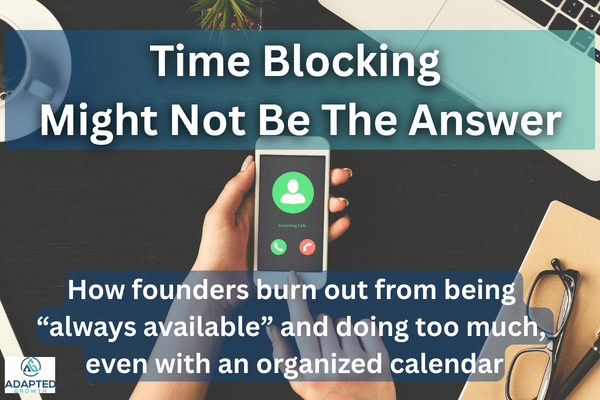When you’ve been the only one selling, it’s natural to feel nervous about handing that responsibility to someone else. After all, no one knows your offer, your clients, or your voice better than you do. However, once you have or will soon have a salesperson, your role shifts from closing deals alone to training salespeople to succeed.
Those are very different tasks.
Well, it may seem counterintuitive, but the best way to do that is by watching them fail, even when it hurts your soul to do so.
The Founder’s Instinct to Step In
Most founders don’t like watching deals fall apart. Especially when they know they could have saved them.
Whether you actually hear them fumble the pitch or notice a deal marked “closed lost” that you think you could’ve won, handing the reins of selling to somebody else is hard.
But saving every deal doesn’t teach your rep anything except that you’ll always step in.
Remember struggling with something in school, say a challenging math concept. Your teacher didn’t do the problem for you. They worked with you until you understood how to do it yourself.
It’s the same thing with training salespeople. If you step in and close deals for them, they don’t learn to think critically, take ownership, or develop the confidence to succeed on their own.
As painful as it is, you have to let them experience what a “miss” feels like. Then guide them through it.
What Failure Looks Like (and Why It’s a Gift)
Let’s be clear — we’re not talking about setting people up to fail. We’re talking about not rescuing them too early when they:
- Run a discovery call that goes off the rails.
- Send a follow-up that gets ignored.
- Forget to confirm the buying process before sending a proposal.
- Fumble the pricing conversation and get flustered.
Those moments sting. But these moments of failure are also the exact points where learning happens fastest.
You can review the call together and ask:
- “What would you do differently next time?”
- “What didn’t feel right to you?”
- “What did you expect the buyer to say, and what actually happened?”
Training salespeople to succeed includes this kind of post-failure reflection. It can be a shortcut to growth if you let it happen.

When Not to Let Them Fail
There’s a massive difference between letting someone learn key lessons through failure versus letting them flail through everything.
If a salesperson is making mistakes that can negatively impact your business or show a complete lack of motivation, then it’s time to step in. The types of missteps that do need your intervention may include:
- Misrepresenting the offer or overpromising outcomes
- Violating your values or policies (pushy behavior, manipulation, sneaking in deep discounts to close the deal, etc.)
- Repeating the same mistake without learning or wanting to learn
- Anything that could damage your reputation or create legal risk
Letting someone fail doesn’t mean being passive. It means being selective about when to coach, when to correct, and when to give space.
Training Salespeople to Succeed Without Taking Over
You’re not just trying to close more deals; you’re trying to build a team that can close deals without you. That means teaching them how to get back up after they fall.
Here are a few ways to do that:
- Normalize failure by sharing your own early sales stories.
- Debrief calls together (not just the bad ones — celebrate the wins too).
- Ask reflective questions, rather than leading ones: “What do you think happened?”
- Keep communication open and warm. Make it okay for them to ask any and all questions by never berating or shaming them for asking, even if its something they “should” know.
- Focus on progress, not perfection. The goal is to learn and find their own way, not memorize a script that can come across as too rigid or inauthentic.
- Establish a feedback rhythm, such as weekly one-on-ones or post-call reviews.
The long game is about building a self-sufficient sales rep who doesn’t just mirror your style but develops their own, while being aligned with your values.
Other Essentials for Training Salespeople to Succeed
While salespeople need to learn from their mistakes, you can take steps to reduce how many they make.
First and foremost, having a tried-and-true documented sales process will give your new sales reps a strong foundation to start with. Even better, consider creating a comprehensive onboarding process that incorporates your sales process, values, and expectations, as well as goals for the first 30, 60, and 90 days, and ongoing support thereafter.
In addition to a sales process, providing your sales reps with the ability to track their progress can help them find their weak points more effectively. A CRM, or even a well-built spreadsheet, highlights their knowledge or process gaps and keeps them from hiding from their struggles.
To better support and train sales reps, it is helpful to understand what motivates them, where they may struggle, and how they prefer to communicate and learn. Personality assessments are a fantastic way to get to know people’s learning and communication styles. If you don’t use them in the hiring process, do yourself a favor and utilize them during onboarding and training.
Finally, it’s important to recognize that being a successful founder or salesperson does not necessarily make you the strongest trainer. If you’re struggling to find a way to bridge the gaps and help your salespeople do their best, get outside support. Scaling a team and business isn’t easy, and you don’t have to do it alone.

Train for Independence, Not Imitation
The biggest mistake founders make when training salespeople to succeed is trying to create a clone of themselves. But you have to remember, your business is your baby. Your reps won’t care the same way you do.
However, with good hiring, process documentation, coaching, tracking, and patience, they can learn and uphold the same values and standards that you do.
You can’t build a team that scales if you’re constantly holding the reins.
So step back — not forever, but long enough for them to take the lead. Let them trip. Let them learn. Then keep walking with them until they find their stride.
That’s how you train a salesperson to succeed.
If you’re not sure where to start in the hiring or training process, let’s talk.









